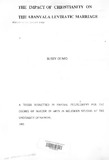| dc.description.abstract | The main concern of this thesis was to investigate to what extent Christianity has contributed to changing the Abanyala attitude towards levirate marriage. The study further questions whether the Roman Catholic Church has appropriately applied the principle of adaptation to African practice of Levirate union.Levirate as a marriage institution among most African patrilineal societies, was prohibited by the Catholic Church as being immoral and unchristian. To this extent, the Church denied the holy Sacraments such as baptism, holy eucharist,matrimony and confirmation to those who entered into leviratic relationships. In making this rule, it was the Church's hope to discourage Christians from practicing levirate marriage. From the research findings, the study. showed that there was no pastoral application of Adaptation of leviratic pattern of marriage arrangement. The theological data further shows that there has never been a conclusive debate in the Catholic Church on levirate custom. The church outrightly identifies the practice as equal to polygamy, an institution with dissimilar objectives. Similarly, levirate union has been associated with cohabitation that is, unlawful sexual union. The comprehending of levirate union has therefore brought misunderstandings between the Catholic Church leaders and the Abanyala Christians and non-christians. Indeed, this study does not call for the change of Catholic theology and teachings, rather it calls on the Catholic Church to reconsider and respond positively while applying the theory of Adaptation to it's doctrines on christian marriage. This will make those African patrilineal societies, who practice levirate union, to comfortably fit into the Church. The Catholic Church should address itself to the Vatican II document which officially advocates for the right of each culture to preserve it's custom and practices within Christianity. This thesis is divided into five chapters. The first chapter, the introduction consists of the significance of the study, related literature, theoretical framework, research methodology and scope/limitations of the study. In the methodology, the use of questionnaire, oral interviews, participant observation and the use of the existing literature was applied. The obtained data was then analyzed and concluded into a thesis. The second chapter presents the background of the studied social group. This comprised of their geographical and historical setting, social, economic and political organization and religious set-up. The third chapter is an attempt at showing the characteristics of traditional Abanyala marriage arrangements. The fourth chapter presents the Abanyala traditional practice of levirate marriage and it's significance. It further presents the Catholic church's view on levirate union. Finally, the thesis concludes in the final chapter that the Catholic church should re-examine and re-address itself to levirate marriage. This will help the Church to comprehend the significant aspects found in the leviratic union: The chapter similarly calls for enculturation through dialogue between Catholic Church leaders and African traditionalists/Christians to choose valuable values found in levirate marriage hence incorporating them into Christian teachings and practices. It is hoped this will help many African societies who practice levirate union feel at home in Christianity. Nevertheless, this study does not claim. it's findings as being exhaustive. It calls on interested scholars to further research into the field of enculturation touching on the Abanyala beliefs and practices that appear to contradict the teachings of the Roman Catholic Church. | en |

